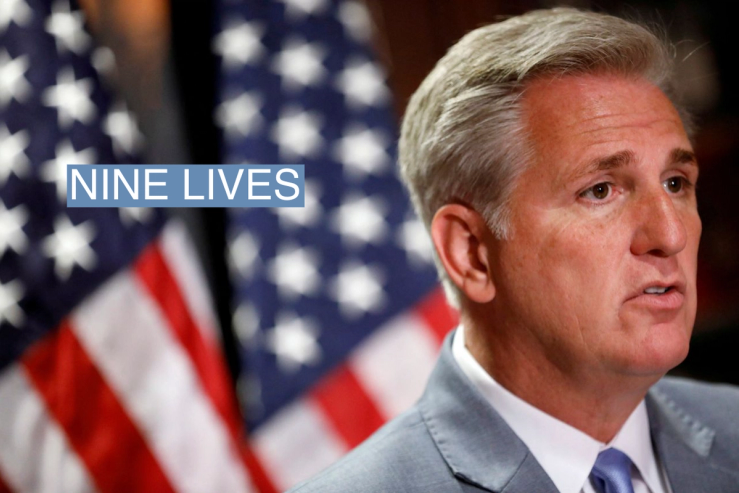The News

Ballot number seven was not any luckier for Kevin McCarthy, who again was rejected by 20 of his fellow Republicans as Speaker of the House on Thursday. He met the same fate on ballot eight. Number nine did not go fine. Ten? Same again.
Democrats again nominated Hakeem Jeffries, D-N.Y. and Republican holdouts again nominated Rep. Byron Donalds, R-Fla. on the seventh ballot. Rep. Matt Gaetz, R-Fla. voted for Donald Trump this time, who has publicly urged Republicans to back McCarthy.
The trolling appeared to be contagious. For vote number eight, Rep. Lauren Boebert, R-Colo. announced her support for “Kevin” — then cheekily clarified she meant Rep. Kevin Hern, R-Okla., chair of the conservative Republican Study Committee (and a McCarthy supporter).
“We need to get to a point where we evaluate what life after Kevin McCarthy looks like,” Boebert said in a speech before the ninth ballot.
With that vote, the saga became the longest quest to choose a speaker since before the Civil War.
While the end results were the same as Wednesday and Tuesday, there’s more movement behind the scenes this time as McCarthy and his allies host talks about a potential deal that might bring some opponents along.
As of Thursday night, there were rumblings of a potential deal that could allow the House to adjourn and potentially bring some — but likely not all — holdouts to McCarthy’s side. Rep. Ralph Norman, R-S.C. told reporters he was waiting to see an offer leadership was preparing in writing.
Know More
Negotiations are still ongoing today on a package of rules changes, committee assignments, and policy commitments to satisfy conservatives who want more control at every level of the House.
In a sign talks were growing more serious, Rep. Chip Roy, R-Texas, a prominent “no” on McCarthy who has been highly visible all week, told reporters he was no longer discussing the details publicly with the press.
“I’m gonna go get behind closed doors and work, ’cause that’s where it is right now,” he said before entering the House chamber.
McCarthy reportedly made a comprehensive offer earlier in the day that allies believe should satisfy every public concern from the holdouts, including a much-discussed rule that would allow a single member to call for a vote to remove him later on. But there’s no one unified set of demands from the rebels and it’s not clear yet a deal is on the table that would get McCarthy to 218 votes.
The million dollar question: How many members are gettable with the right concessions and how many are out on McCarthy, full stop?
“You don’t ever have to ask me again if I’m a no,” Rep. Bob Good, R-Va. told the Washington Post on Thursday morning. “I will never vote for Kevin McCarthy.”
Another “no” vote on McCarthy, Rep. Scott Perry, R-Pa. said there was still no deal and expressed outrage that details of talks had become public. “When confidences are betrayed and leaks are directed, it’s even more difficult to trust,” he tweeted.
Meanwhile, members of the more pragmatic Main Street Caucus met with McCarthy Thursday morning to hear the latest. Some have spent weeks warning against conceding too much to conservatives, who they fear will make basic governance difficult if placated, and it’s an open question whether resistance to a deal from the center might factor into talks.
“There’s some things we don’t prefer, but Kevin’s negotiating, we’ll hear what they come out with,” Rep. Don Bacon, R-Nebraska, said. “We’re committed to him.”
Several members expressed concern about conservative demands to give them more sway over key committees, including the powerful House Rules Committee, which Bacon called “affirmative action for the smallest caucus we have.”
“If you work your way up through hard contributions, hard work on committee assignments and you get passed over because of some other circumstances, that’s not fair,” Rep. Dan Newhouse, R-Wash. said.
“They shouldn’t have more than what the other members have,” Rep. Nicole Malliotakis, R-N.Y. said. “We should have equal representation.”
California Rep. Josh Harder, a Democrat, said that some of the changes the holdouts were demanding had merit. Holding separate votes on every appropriations bill, while allowing amendments, was “actually a good idea,” but not as workable as Republicans hoped.
“Omnibus packages are nobody’s first choice, but the bottleneck there is the Senate,” said Harder. “It hasn’t passed appropriations bills in forever.”
Allowing a single member to force a vote on the speaker wasn’t a “big problem” either, said Harder. The problem was that negotiations were “empowering the far right,” which would have consequences.
Former Speaker of the House Nancy Pelosi dismissed speculation Democrats might get involved in helping choose a Republican speaker if the stalemate continued.
“This is a majority — they have to elect a leader from their ranks,” she said. “We can help on policy.”
— Dave Weigel, Kadia Goba, Shelby Talcott, and Morgan Chalfant contributed to this story

